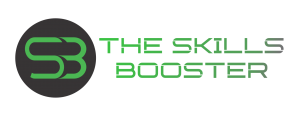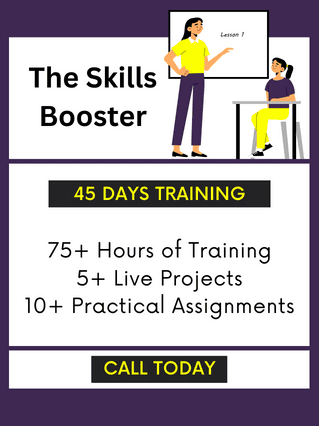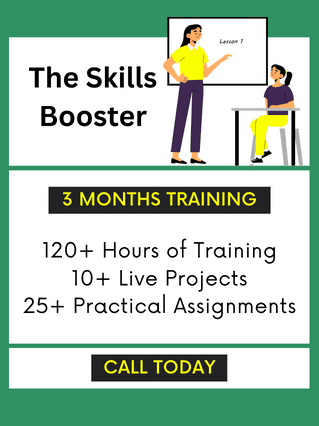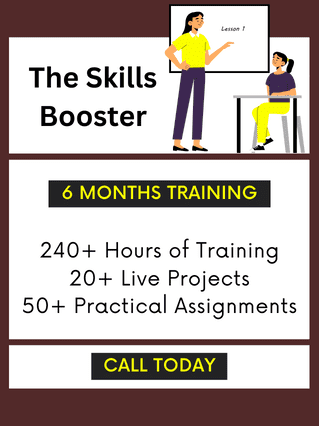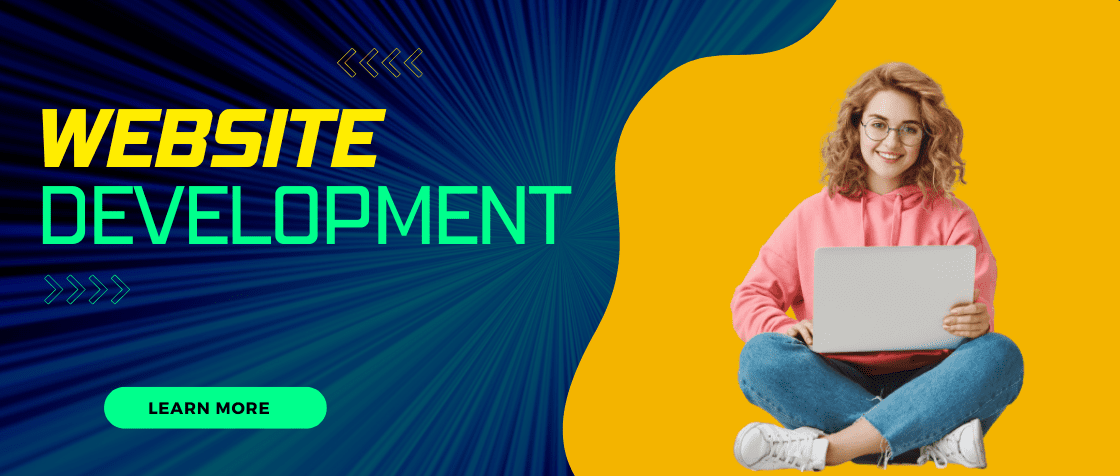
“The Skills Booster” training institute offers a comprehensive training program in web development, designed to provide students with hands-on experience, industry-standard tools, and practical knowledge to succeed in the field.
Our program is led by experienced instructors who are experts in web development, and our state-of-the-art facilities provide an optimal learning environment. Graduates from our program will have the necessary skills and knowledge to succeed in the competitive field of web development, making them highly employable and in demand in today’s job market.
- Overview of the web development process
- Basic concepts of HTML, CSS, and JavaScript
- Overview of website hosting and domain names
- Introduction to website design principles
- HTML tags and structure
- CSS syntax and selectors
- Box model and layout
- Responsive design with media queries
- Variables, data types, and operators
- Control structures and loops
- Functions and event handling
- Debugging and troubleshooting techniques
- Advanced CSS selectors and properties
- Flexbox and Grid layout
- CSS preprocessors (e.g. SASS)
- Accessibility and usability considerations
- Object-oriented programming
- Document Object Model (DOM) manipulation
- Asynchronous programming and APIs
- Frameworks and libraries (e.g. jQuery, React)
- Introduction to Node.js and its architecture
- Asynchronous I/O and event-driven programming
- Building server-side applications with Node.js
- Security considerations and best practices
- Introduction to MongoDB and NoSQL databases
- Data modelling and schema design
- Querying and indexing
- CRUD operations and data aggregation
- Introduction to RESTful API design principles
- Building RESTful endpoints with Express.js
- Authentication and authorization mechanisms
- API documentation and testing
- Introduction to React and its component-based architecture
- Building dynamic and interactive user interfaces
- State management with Redux
- Integration with server-side APIs
- Introduction to Progressive Web Apps (PWA)
- Service workers and offline functionality
- Push notifications and background sync
- Lighthouse and PWA best practices
- Introduction to web performance optimization
- Critical rendering path optimization
- Resource loading and caching strategies
- Measuring and monitoring web performance metrics
- Introduction to DevOps and its principles
- Continuous integration and deployment (CI/CD)
- Containerization with Docker
- Infrastructure as code with Terraform
- Introduction to web security threats and vulnerabilities
- Cross-site scripting (XSS) and SQL injection attacks
- Security headers and HTTPS encryption
- Best practices for web security
- Introduction to web analytics and SEO
- Google Analytics and other web analytics tools
- On-page and off-page SEO techniques
- A/B testing and conversion rate optimization
- Team-based project development with industry-standard tools and frameworks
- Agile methodologies and project management tools
- Version control with Git and GitHub
- Portfolio creation and showcasing your projects to potential employers
- React hooks and functional components
- Context API and provider pattern
- React router and client-side routing
- Integration with third-party libraries and APIs
- Introduction to MERN stack (MongoDB, Express.js, React, Node.js)
- Building full-stack applications with MERN stack
- Authentication and authorization with JSON Web Tokens (JWT)
- Deployment to cloud platforms (e.g. AWS, Heroku)
- Introduction to real-time web applications
- Understanding the need for real-time web applications
- Introduction to Socket.IO and its architecture
- Building real-time web applications with Socket.IO
- Integrating Socket.IO with server-side frameworks (e.g. Node.js, Django)
- Handling real-time events and broadcasting messages
- Scaling Socket.IO applications with load balancing and clustering techniques
- Advanced Socket.IO techniques and libraries.
- Introduction to React Native and its architecture
- Building mobile apps with React Native
- Navigation and routing
- Integration with server-side APIs and third-party libraries
- Introduction to web scraping and automation
- Parsing HTML and XML with Python
- Scraping data from websites using Python
- Automating web tasks with Selenium and Beautiful Soup
- Introduction to web accessibility and inclusive design
- Understanding accessibility guidelines (e.g. WCAG)
- Designing for diverse user groups (e.g. people with disabilities)
- Testing and evaluating website accessibility
- Introduction to serverless computing and AWS Lambda
- Creating and deploying serverless functions
- Integrating with other AWS services (e.g. API Gateway, DynamoDB)
- Cost optimization and monitoring
- Introduction to blockchain technology and its applications
- Building decentralized web applications with Ethereum
- Smart contract development with Solidity
- Integration with front-end web applications
- Introduction to data visualization and D3.js library
- Creating interactive charts and graphs with D3.js
- Data-driven documents and visualizations
- Advanced D3.js techniques and libraries
- Introduction to cloud computing and AWS
- Setting up and managing AWS infrastructure
- AWS compute and storage services (e.g. EC2, S3)
- Security and compliance considerations
- Introduction to artificial intelligence and machine learning
- Building web applications with machine learning models
- Natural language processing (NLP) and sentiment analysis
- Integration with cloud-based AI services (e.g. Amazon SageMaker)
- Introduction to Web Assembly and its applications
- Building high-performance web applications with Web Assembly
- Introduction to WebRTC and its applications
- Building real-time communication applications with WebRTC
- Introduction to web testing and quality assurance
- Types of web testing (e.g. unit testing, integration testing)
- Testing frameworks and tools (e.g. Jest, Cypress)
- Continuous testing and quality assurance practices
- Introduction to the microservices architecture
- Building scalable and distributed web applications with microservices
- Container orchestration with Kubernetes
- Service mesh and API gateways
- Introduction to emerging trends and technologies in web development
- WebAssembly, PWAs, and other new technologies
- Understanding the impact of emerging technologies on web development
- Preparing for the future of web development.
I hope these additional modules will provide comprehensive and advanced training for aspiring web developers. “The Skills Booster” training institute offers hands-on training with experienced instructors, state-of-the-art facilities, and industry-standard tools and frameworks. Graduates from our program will have the necessary skills and knowledge to succeed in the competitive field of web development.
Why The Skills Booster for Web Development Training
45 Days Industrial Training
For 45 days industrial training, the Skills Booster program can provide students with intensive training modules, focusing on specific areas of study. These modules are designed to equip students with the skills required to succeed in their industrial training program in a short amount of time. The program includes workshops, practical training sessions, and mentorship, allowing students to gain valuable experience and insight into their chosen field.
3 Months Industrial Training
For 3 months industrial training, the Skills Booster program can provide a more comprehensive approach to training. The program can offer students a more in-depth understanding of their chosen field, allowing them to gain a wider range of skills and knowledge. The program can also include industry visits, guest lectures, and networking opportunities, providing students with a holistic view of the industry and building their professional network.
6 Months Industrial Training
For 6 months industrial training, the Skills Booster program can provide students with a more immersive and hands-on experience. The program can offer students longer-term projects, giving them the opportunity to apply their skills and knowledge to real-life situations. Additionally, the program can include training in areas such as project management, team leadership, and communication, which are essential for success in any professional environment.
At The Skills Booster, we offer a comprehensive Web development program that covers all these modules and more. Our program is designed to equip you with the skills and knowledge you need to succeed in today’s digital marketing landscape. Our experienced instructors provide hands-on training and real-world examples to help students develop practical skills and apply their knowledge in a business context.
Contact us today to learn more about our Web Development Training and how we can help you achieve your career goals.

